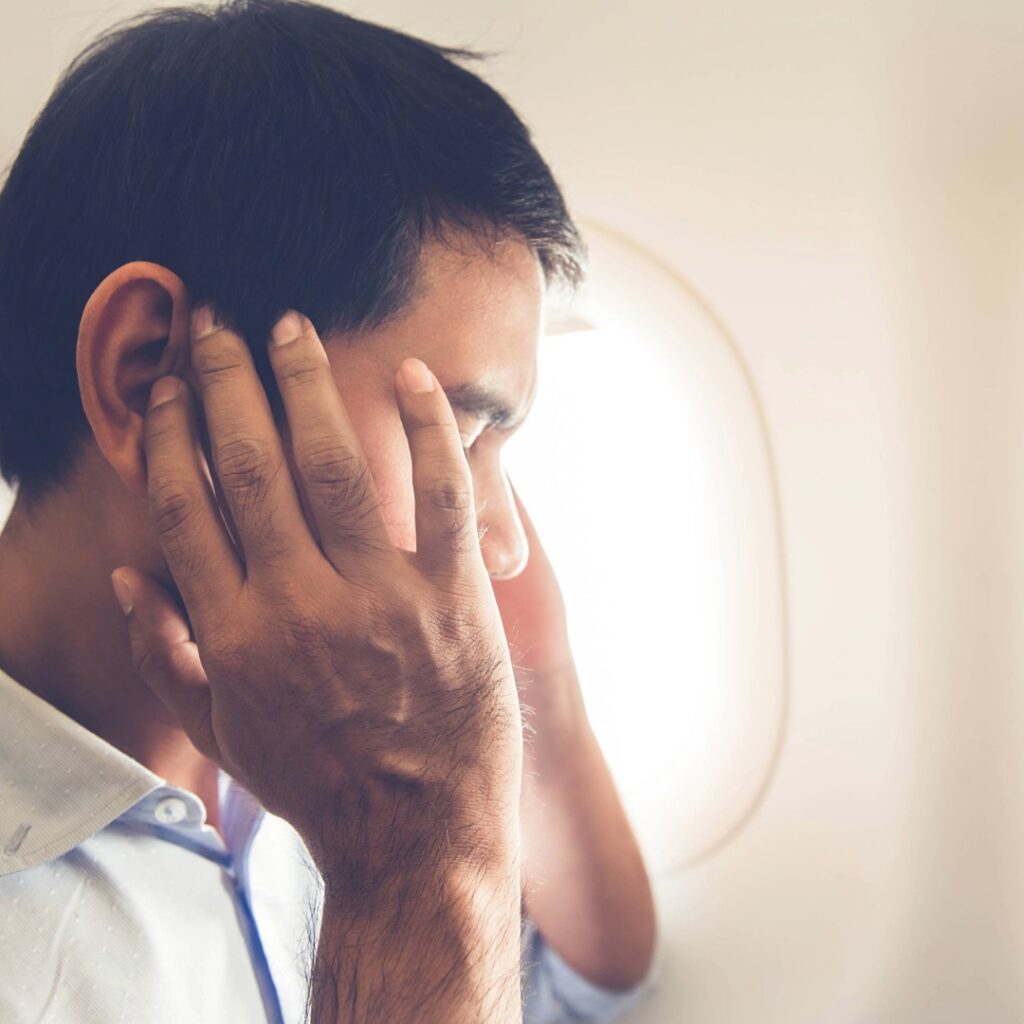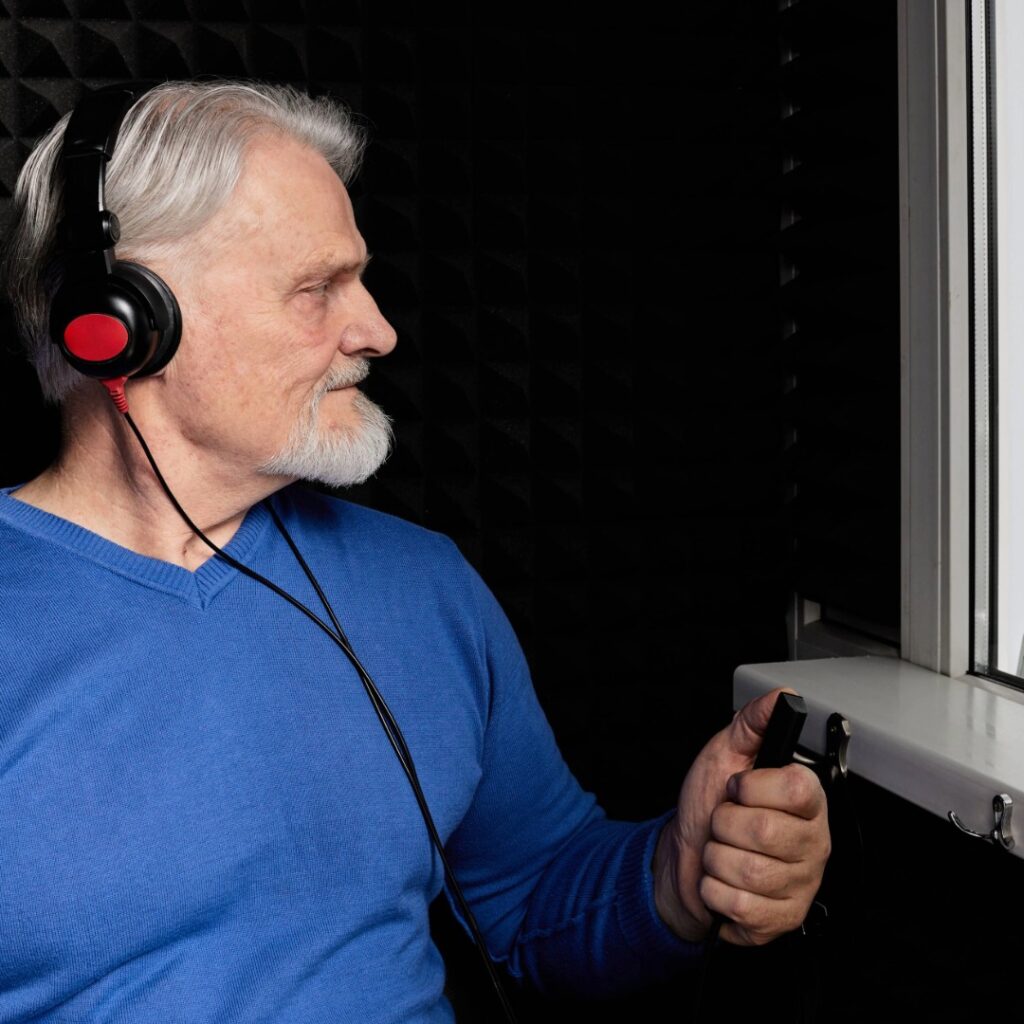Disclaimer: This article is for educational purposes only and is not a substitute for medical advice. If you experience sudden hearing loss, bleeding from the ear, or symptoms after head trauma, call 911 or visit an emergency room immediately.
Hearing loss is often gradual, but not always. Sometimes it happens in a moment. A blast. A fall. A change in pressure. Physical trauma can cause immediate or delayed hearing issues, some of which may be permanent if left untreated.
Whether you’re recovering from an accident or just starting to notice subtle hearing changes, it’s important to understand how trauma affects your hearing and what you can do about it.
What Is Trauma-Related Hearing Loss?
Trauma-related (sometimes referred to as injury-related) hearing loss occurs when an external force injures the ear or auditory system. Depending on where the damage occurs, the hearing loss may be:
- Sensorineural hearing loss: caused by damage to the inner ear or auditory nerve
- Conductive hearing loss: due to blockages or damage to the outer or middle ear
- Mixed: involving both sensorineural and conductive components
Injury-related hearing loss can develop suddenly or gradually, and sometimes symptoms don’t appear until days or weeks after the incident.
What Is Acoustic Trauma Hearing Loss?
Acoustic trauma happens when the ear is exposed to an extremely loud sound — usually over 120 decibels. Sounds at this level can damage the delicate hair cells in the cochlea, leading to permanent sensorineural hearing loss.
Common causes of acoustic trauma include:
- Gunfire or explosions
- Fireworks or industrial accidents
- Equipment malfunctions or sudden loud feedback at concerts
Symptoms of acoustic trauma:
- Sudden hearing loss in one or both ears
- Ringing or buzzing in the ears (tinnitus)
- A sensation of fullness or pressure in the ear
Noise-induced hearing loss (NIHL) is closely related and shares similar prevention strategies — like wearing hearing protection in loud environments.

Concerned About Acoustic Trauma?
If you’ve experienced sudden hearing loss, ringing (tinnitus), or ear fullness after exposure to loud noise — whether from gunfire, fireworks, or a concert — don’t wait. Visit a certified hearing care professional near you for a thorough evaluation.
How Can a Head Injury or Concussion Affect Hearing?
Hearing loss after a head injury, or even a mild concussion, can occur when parts of the auditory system are damaged. This may include:
- The ossicles, the tiny bones in the middle ear
- The cochlea, located in the inner ear
- The auditory nerve, which carries signals to the brain
- The brain regions responsible for interpreting sound
Sometimes the impact causes immediate symptoms, but in other cases, hearing changes may appear days or even weeks after the injury.
Common signs of Traumatic brain injury (TBI)-related hearing loss:
- Trouble understanding speech, especially in noisy environments
- Muffled or distorted hearing
- Tinnitus (ringing or buzzing) or increased sensitivity to sound
- Dizziness or vertigo
If the temporal bone is involved in the injury, it can result in either conductive hearing loss, sensorineural hearing loss, or a combination of both.
Can Barotrauma Cause Hearing Loss?

Yes. Barotrauma can lead to hearing loss when there’s a sudden change in air or water pressure. This often happens during:
- Airplane takeoff or landing
- Scuba diving
- Skydiving or hyperbaric therapy
If the eustachian tube (which helps equalize pressure in the ear) can’t adjust quickly enough, the pressure imbalance can cause:
- A ruptured eardrum
- Fluid buildup in the middle ear
- Inner-ear damage, such as a labyrinthine concussion
Symptoms of barotrauma-related hearing loss may include:
- Muffled or “underwater” sound quality
- Pressure or pain in the ear
- Dizziness or balance problems
In many cases, barotrauma is usually temporary and improves with time or basic care. However, if left untreated, it can lead to longer-term hearing or balance issues.
What Are the Effects of Blunt or Penetrating Ear Trauma?
Physical trauma to the ear, whether from a direct impact or inserting something into the ear canal, can cause conductive hearing loss by disrupting the structures that help sound travel through the ear.
Common causes of blunt or penetrating ear trauma include:
- Inserting objects like cotton swabs, bobby pins, or hearing aid domes
- Blows to the ear from sports injuries, falls, or car accidents
- Sharp objects accidentally piercing the ear canal
Signs of trauma-related ear injury:
- Sudden hearing loss
- Blood or clear fluid coming from the ear
- Ringing, pain, or a sensation of fullness
Some injuries may heal on their own, but more serious cases, like a ruptured eardrum or damaged middle-ear bones, may require medical or surgical treatment. Damage to the ear can also increase the risk of infection if not properly evaluated and managed.
What’s the Difference Between Sensorineural and Conductive Hearing Loss From Trauma?
Trauma can affect different parts of the auditory system, leading to either sensorineural or conductive hearing loss — or sometimes both.
Sensorineural Hearing Loss
This type of hearing loss occurs when there is damage to the inner ear (such as the cochlea or auditory nerve) or the brain areas that process sound. It’s commonly caused by:
- Acoustic trauma (e.g., exposure to gunfire or explosions)
- Traumatic brain injury (TBI)
- Inner-ear damage from barotrauma or skull fractures
Because the sensory cells or nerves involved in hearing cannot regenerate, sensorineural hearing loss is usually permanent. However, it can often be managed with hearing aids or cochlear implants, depending on severity.
Conductive Hearing Loss
Conductive hearing loss happens when sound is physically blocked or can’t travel effectively through the outer or middle ear. This may be caused by:
- A ruptured eardrum
- Fluid buildup from barotrauma
- Dislocated ossicles (middle ear bones)
- Foreign objects or swelling in the ear canal
Unlike sensorineural loss, conductive hearing loss is often temporary or reversible — especially when the underlying issue is treated through medication, minor procedures, or surgery.
Why This Distinction Matters
Understanding whether hearing loss is sensorineural, conductive, or mixed helps shape the care plan that follows. Diagnostic tests are used to identify the type and severity of the loss, which then informs:
- Whether the hearing loss may improve on its own or with treatment
- What types of treatment or hearing technology may be effective
- Whether referral to a medical specialist (like an ENT) is needed
A thorough evaluation can help pinpoint where the damage occurred and what kind of care you need moving forward.
What Happens During a Hearing Loss Evaluation?

If you’ve experienced a traumatic injury and notice changes in your hearing, a certified hearing care provider will perform a thorough evaluation to understand where the damage occurred and how it’s affecting your hearing.
A typical hearing evaluation may include:
- Otoscopy: A visual inspection of the ear canal and eardrum to check for signs of injury, blockage, or infection
- Tuning fork tests: Simple tests that help determine whether the hearing loss is conductive (outer/middle ear) or sensorineural (inner ear/nerve)
- Audiometry: A detailed hearing test that measures your ability to hear different pitches and understand speech
- Tympanometry: A test that evaluates how well your eardrum moves and how your middle ear is functioning
- Imaging (CT or MRI): Used when more serious trauma is suspected, such as a skull fracture or inner-ear damage
Together these tests help pinpoint the source and severity of the hearing loss, so your provider can determine whether it’s likely to improve or whether treatment or hearing technology may be needed.

Ready to Get Your Hearing Checked?
Don’t leave your hearing to chance. Schedule a comprehensive hearing evaluation with a certified provider today so you can pinpoint the cause of your hearing changes and explore the best treatment options.
How Is Trauma-Related Hearing Loss Treated?
Treatment for hearing loss depends on the type of trauma and which part of the ear is affected. Some conditions improve with medication or rest, while others may require surgical repair or hearing technology for long-term support.
If the cause is acoustic trauma (from sudden loud noise):
- Corticosteroids may help reduce inflammation and preserve inner-ear function
- Hyperbaric oxygen therapy is sometimes used in the first 48-72 hours to support recovery (in select cases)
- Hearing aids or cochlear implants may be recommended if the hearing loss is permanent
If the cause is a head injury or TBI:
- Surgical repair of the middle-ear bones (ossicles) if they were displaced or damaged
- Tinnitus treatment, such as sound therapy or cognitive behavioral therapy (CBT), for those with persistent ringing
- Hearing technology, like hearing aids, to support long-term hearing loss
If the cause is barotrauma (pressure-related injury):
- Decongestants or antihistamines may help restore normal eustachian tube function
- Pressure-equalizing techniques, such as yawning or swallowing, may be helpful for minor cases
- Surgery may be needed for more severe or chronic cases, especially if the eardrum is ruptured
If the cause is penetrating or blunt trauma:
- Foreign object removal should only be performed by a medical professional to avoid further damage
- Tympanoplasty, a surgical procedure to repair a ruptured eardrum, may be required
- Ossicular chain reconstruction may be needed if the tiny bones of the middle ear are damaged
Your provider will recommend the best course of action based on the type and severity of your injury, as well as how much hearing loss you’re experiencing.
When Should I Seek Medical Attention for Trauma-Related Hearing Loss?
Some hearing issues after an injury need immediate medical care. If you experience any of the following, go to the emergency room or call 911 right away:
- Sudden hearing loss in one or both ears
- Blood or clear fluid leaking from the ear
- Severe dizziness, vertigo, or balance problems after an injury
- Bruising behind the ear or around the eyes (which may indicate a skull fracture)
These symptoms could signal a serious medical emergency, such as a concussion, brain injury, or sudden sensorineural hearing loss. In this type of emergent situation, care should come from a medical doctor (M.D.), such as an emergency physician or ENT specialist who can assess the individual’s situation and direct care which may include a consultation with an audiologist (Au.D.), a hearing care professional trained in diagnosing and treating hearing disorders, can assess your hearing and guide your next steps in recovery.
What’s the Outlook for Recovery From Trauma-Related Hearing Loss?
Recovery from trauma-related hearing loss depends on the type and severity of the injury. In some cases, hearing returns on its own or improves with medication. Other times, hearing loss may be permanent — but hearing aids, cochlear implants, and rehabilitation can make a big difference.
The encouraging news? With the right diagnosis and care plan, many people can regain function, protect their remaining hearing, and continue living full, connected lives.
Can Trauma-Related Hearing Loss Be Prevented?

In many cases, yes. While not all injuries can be avoided, taking a few smart precautions can significantly lower your risk of trauma-related hearing loss:
- Wear hearing protection (like earplugs or earmuffs) in loud environments such as concerts, extreme sporting events, construction sites, or shooting ranges.
- Be cautious when inserting anything into your ears. Avoid using cotton swabs, hairpins, or other objects that could push wax deeper or damage the ear canal. Use earbuds and earplugs as intended, and check that tips are secure to prevent them from getting stuck.
- Use a helmet or protective headgear during activities like biking, contact sports, or construction work.
- Follow safe flying and diving practices, including equalizing pressure gradually.
- Treat congestion or sinus issues before flying or diving to help prevent painful pressure buildup (barotrauma).
Being proactive can go a long way in protecting your hearing and avoiding long-term damage.
Quick Answers About Trauma-Related Hearing Loss
What is acoustic trauma hearing loss?
Acoustic trauma hearing loss occurs when an extremely loud sound, typically above 120 dB, damages the hair cells in your cochlea, leading to permanent sensorineural hearing loss. Common causes include gunfire, explosions, or sudden feedback at concerts, and often present with immediate hearing reduction and tinnitus.
Can a head injury or concussion cause tinnitus and hearing loss?
Yes. Hearing loss after head injury or concussion (TBI auditory dysfunction) can arise from damage to the ossicles, cochlea, or auditory nerve, and may include tinnitus, muffled hearing, or balance issues. Symptoms sometimes surface days to weeks later, so it’s important to get an audiometry evaluation post‑trauma.
What is barotrauma hearing loss, and when does it happen?
Barotrauma hearing loss happens when rapid pressure changes, such as during airplane takeoff, scuba diving, or hyperbaric therapy, overwhelm your eustachian tube’s ability to equalize. It can cause eardrum perforation, fluid buildup, or labyrinthine concussion, resulting in ear fullness, pain, or temporary conductive hearing loss.
How does penetrating ear injury hearing loss differ from blunt force ear trauma?
Penetrating ear injury hearing loss stems from objects entering the ear canal (e.g., cotton swabs, deep‑inserting earbuds), which can puncture the eardrum or damage middle‑ear structures. In contrast, blunt force ear trauma (like a blow in sports or falls) often leads to ossicular chain dislocation trauma or tympanic membrane tears, both causing conductive hearing loss from trauma.
How HearingLoss.com Can Help
If you’ve already received medical care but are still noticing changes in your hearing after an injury, HearingLoss.com is here to support your next step.
We connect you with certified hearing care providers, many of whom have experience treating trauma-related hearing loss. Whether you need a diagnostic evaluation, treatment options, or long-term support, our providers are trained to deliver personalized, patient-first care.
You’ll also find educational resources to help you understand your recovery, know what to expect, and feel confident in your care journey.
You don’t have to figure this out on your own. Start with guidance you can trust, right here.
References
- Acoustic trauma: MedlinePlus Medical Encyclopedia. (2021). Medlineplus.gov. https://medlineplus.gov/ency/article/001061.htm. Accessed June 10, 2025.
- Ear infection (middle ear)-Ear infection (middle ear) – Symptoms & causes. (2025). Mayo Clinic. https://www.mayoclinic.org/diseases-conditions/ear-infections/symptoms-causes/syc-20351616. Accessed June 10, 2025.
- Ears and Altitude (Barotrauma). (2024, January 24). ENT Health. https://www.enthealth.org/conditions/ears-and-altitude-barotrauma/. Accessed June 10, 2025.
- Murphy-Lavoie, H. M., & Mesut Mutluoglu. (2023, June 4). Hyperbaric Treatment of Sensorineural Hearing Loss. NIH.gov; StatPearls Publishing. https://www.ncbi.nlm.nih.gov/books/NBK459160/. Accessed June 10, 2025.
- Ossicular Chain Reconstruction. (2025). Yale Medicine. https://www.yalemedicine.org/clinical-keywords/ossicular-chain-reconstruction. Accessed June 10, 2025.
- Traumatic Brain Injury & Concussion. Traumatic Brain Injury & Concussion. (2024, August 13). CDC. https://www.cdc.gov/traumatic-brain-injury/. Accessed June 10, 2025.
- Tympanoplasty. (2023, August 31). Cleveland Clinic. https://my.clevelandclinic.org/health/treatments/24406-tympanoplasty. Accessed June 10, 2025.
- Wei, B. P., Stathopoulos, D., & O’Leary, S. (2013). Steroids for idiopathic sudden sensorineural hearing loss. Cochrane Database of Systematic Reviews. https://doi.org/10.1002/14651858.cd003998.pub3. Accessed June 10, 2025.
Book a Professional Hearing Evaluation
An online hearing screener is an important step, but it can’t replace a comprehensive hearing exam by a HearingLoss.com professional. Our goal is to deliver expert hearing loss solutions that improve your life.
Don’t wait! Find your local provider and request an appointment today.
